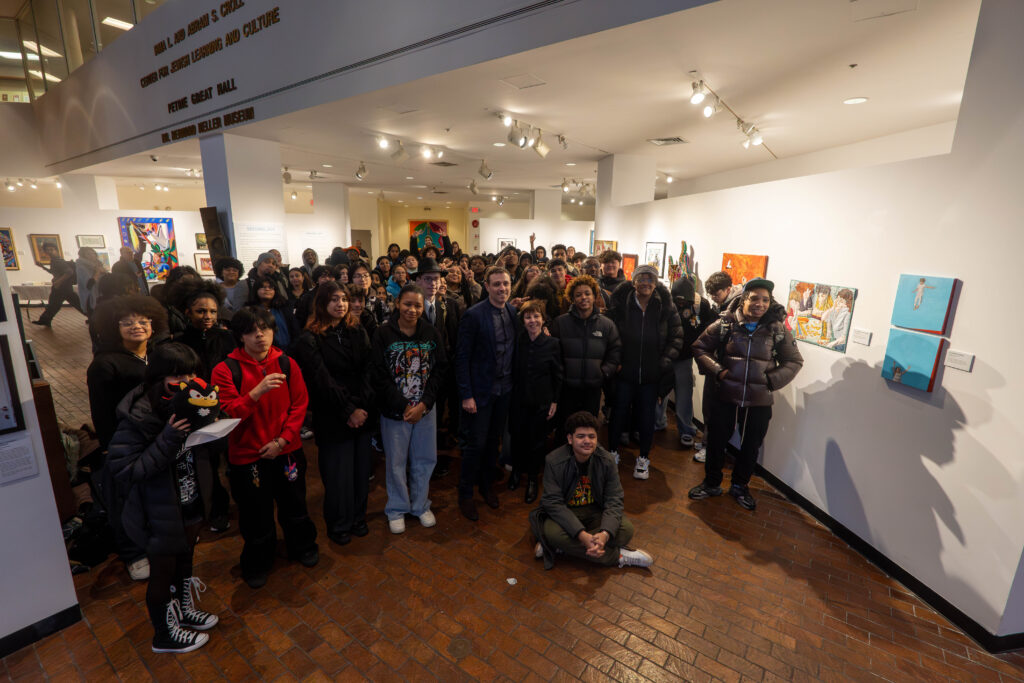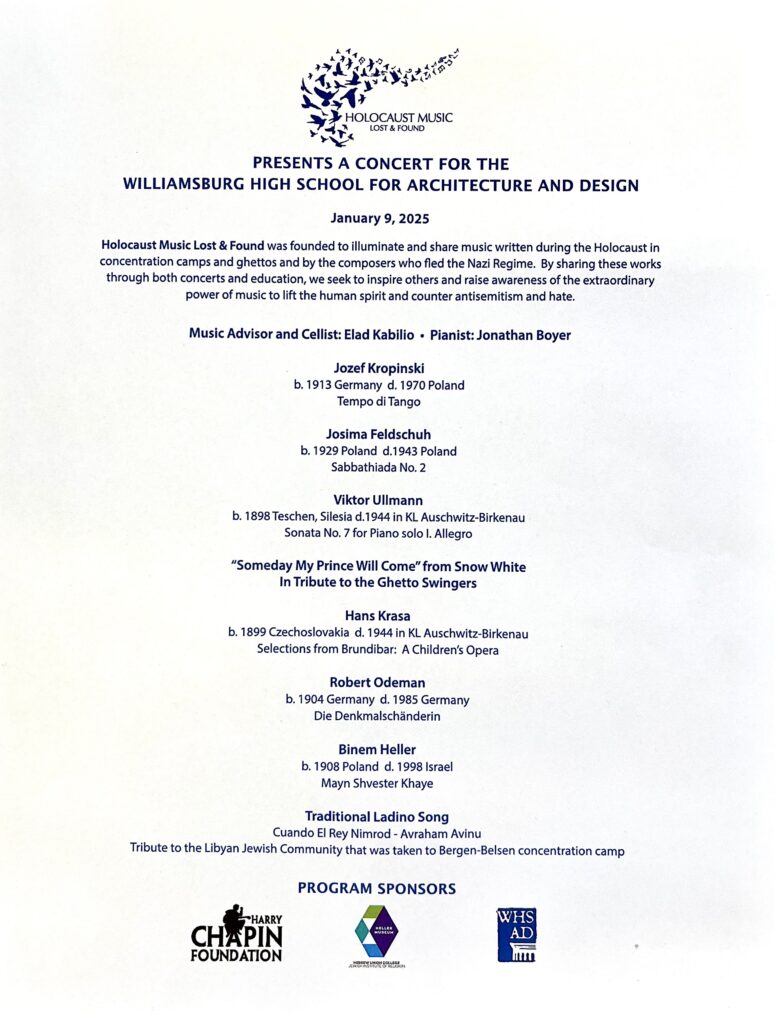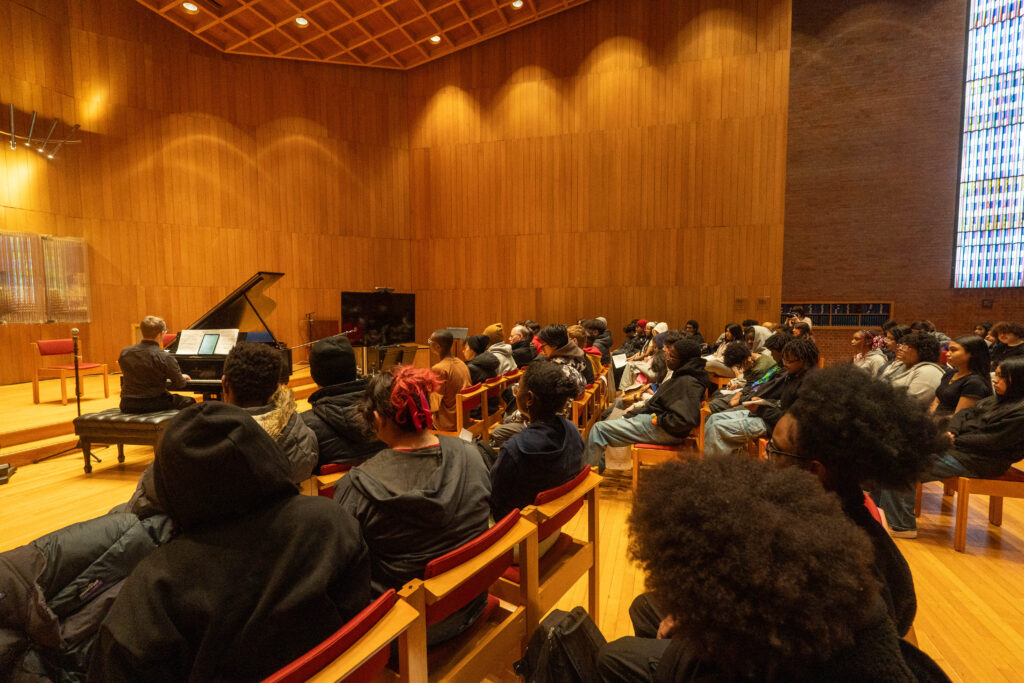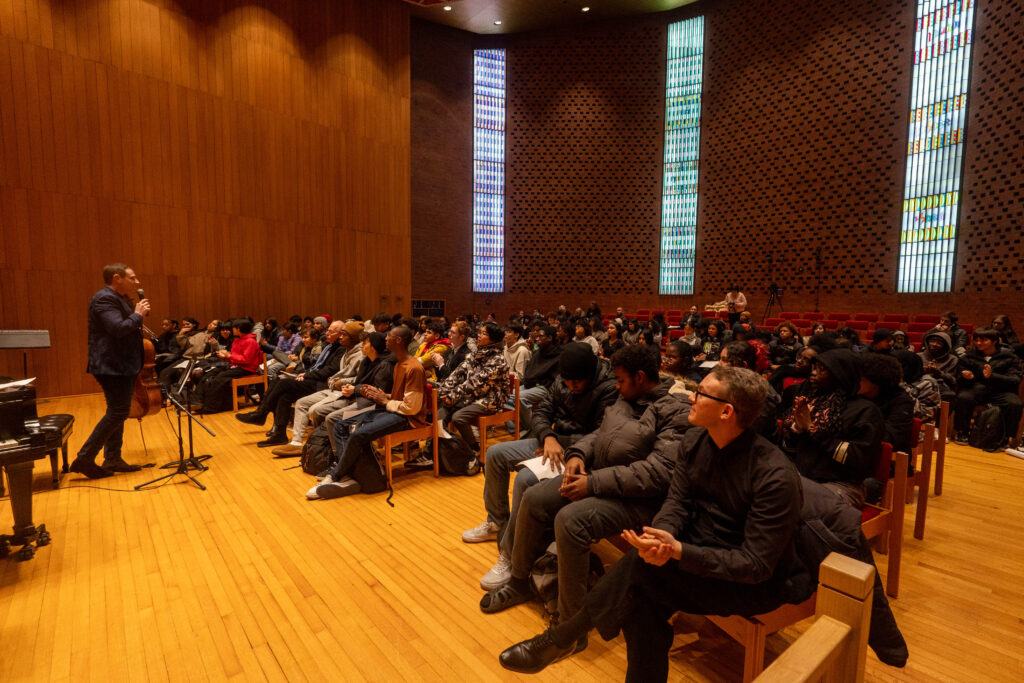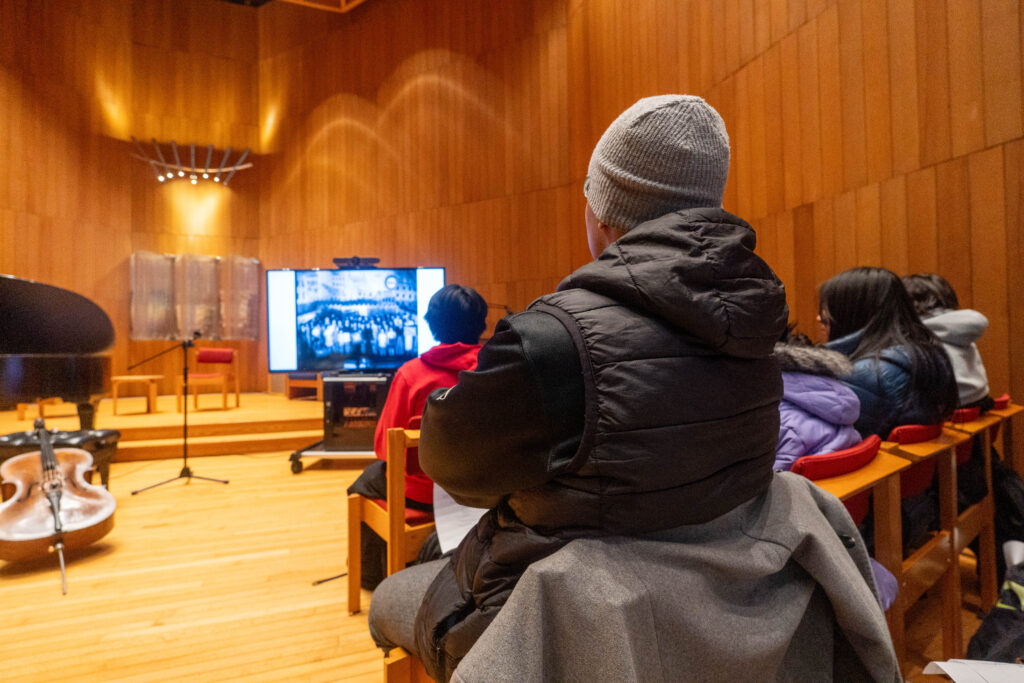Sophomore, Julian Spiro, wrote the following narrative. Below this are questions other WHSAD Sophomores answered about their experiences.
Thank you to Hebrew Union College, Musicians Elad Kabilio and Jonathan Boyer, and The Harry Chapin Foundation, which sponsored a grant for this event.
This past Thursday, January 9th students attended a concert done by the Holocaust Music Lost & Found at Hebrew Union College on 1 West 4th St. The eight song program told the stories of composers who had suffered through the Holocaust and how the remembrance of these songs highlights the importance of hope and the ability to dance shines in a time of darkness.
Before you enter the doors of the college, a sort of shelved brick building on the street corner greets you. Although the building is not particularly tall nor impressive in terms of design, it carries a sense of powerful belonging on the street. It proudly displays the college’s logo, said to be reflective of their progressive approach to tradition through the lens of contemporary Jewish experience. The calm and sleek brick faces also serve to add to the effect of fitting in, cohesive to all the surrounding historic buildings. Yet texturally it’s interesting in its own right and still manages to stand out, boasting its own importance as an institution. The most interesting part of the place however, is how the Synagogue is positioned to be an angled piece jutting out from the building, creating a hallway to the entrance and almost hiding it. Turn a corner, then another corner, while on a corner, and you’ve entered the Hebrew Union College.
Inside the doors, students were greeted in the college lobby and ushered into the Synagogue. The Synagogue is a pale wood cabin-like room, with smartly designed interlocking chairs forming lines of seats oriented around the focal point: the front of the room. At the front was a magnificent piano and cello, foreshadowing the show the students were about to experience. The room is flooded in light as well; alternating lights created a halo of art said to express the connection between man and the divine. The room is a smart design of modernity and tradition, aptly reminiscent of the message the institution wears.
Once students were comfortably seated, the Music Advisor and Cellist, Elad Kabilio gave context to the day’s events in tandem with the Pianist, Jonathan Boyer, who began to take us on a trip through sound. Exploring emotions, memories, experiences, and bonds that students at the high school age should be learning exactly at that age. Teaching about a composer who was the student’s age, imaginatively and prodigiously talented. Or the connection of the media to the individual through the unique advantage Jews have of historically not having a home. Jews are a people who have the diaspora, having taken influence from every culture, yet remaining their own. Or composers who were condemned for their identities and died in the camps they were sentenced to, yet their music still sang of hope and memories of their loved ones. One piece was from an opera sung by a children’s choir, telling the story of children who band together to bravely fight an evil tyrant with a mustache. And the children win.
Such an experience is so essential for children at the high school age because it teaches them to challenge the history that society has come to conceive of as “Jews” through direct records of emotions and memories, translated and expressed. The music is the living memories and experiences of those who suffered, but also those who boldly lived and clung to hope and happiness. Even more directly, through the music itself it also teaches kids to learn the quality of not just “hearing”. The exposure of sounds and pieces such as ones that have been uncovered and found by the Holocaust Music Lost & Found, researched and brought back to life, as well as sounds that students don’t usually listen to. Classical scores or tango music that make you feel deeply; it’s such a foreign sound to most yet at a high production quality it negates the need for prior recognition. It tells students not to listen, but relish; experience the menu put in front of you by not eating but by tasting and savoring, be mindful of the art and artistry on display in front of you.
What was a memorable moment from the day’s trip? Which song stuck with you most?
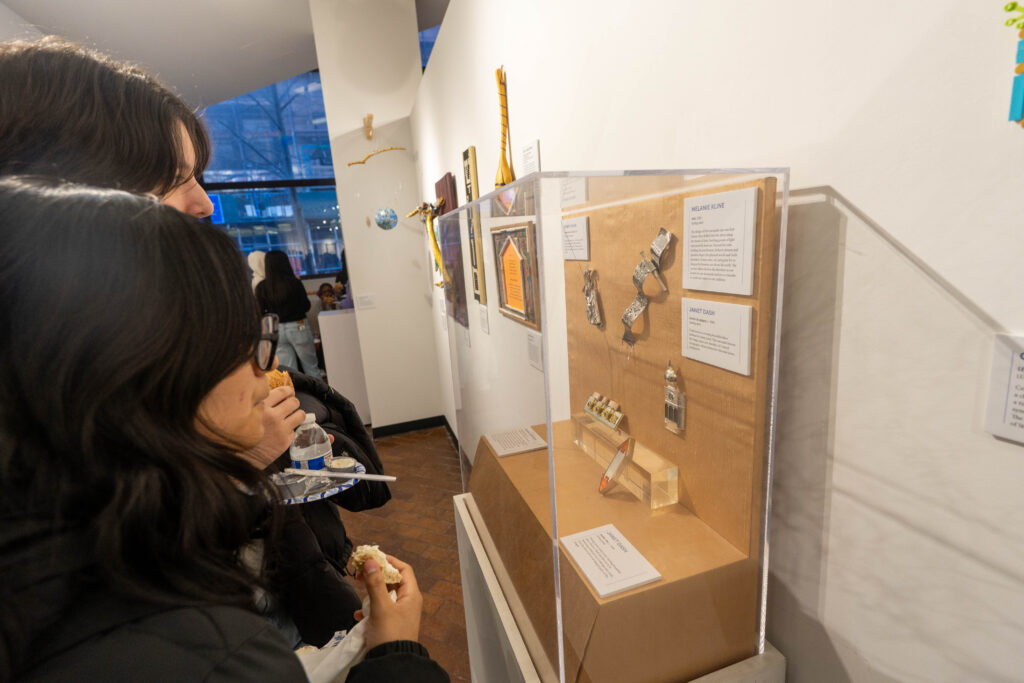
A memorable moment from today’s trip was hearing the story of a little girl who created music during the Holocaust. The song I heard began in a playful, silly way but it was slowly becoming more sophisticated. Suddenly, there was a shift and the notes became dark. I believe this progression reflects her life during the Holocaust because it shows how it took a significant turn. She started as a happy, free, young girl but as the Holocaust continued, she grew up and began to realize the horrors around her. She then observed and experienced traumatic events, which explains why the song’s mood changed.
-Daisy Carrion Rosas
A memorable moment from today’s trip is how one of the songs on the program was from Snow White called “Some day my prince will come” and how the song resembles the people in the concentration camps and how they will be rescued one day just like Snow White because a prince saved her.
-Melissa Macias
A memorable moment from this trip was the intermissions between each piece. I find it memorable because after the end of each piece the speaker would talk about the backstory of the composer or if the song didn’t necessarily have a name behind it, the reason why it was chosen to be played and the importance of what it represents.
-Jelani Wilson
A memorable moment from the day’s trip was basically everything in general. The piano playing and the Cello was amazing, I loved it so so so so much!!!! I really liked the windows, they were pretty and vibrant. My favorite song from the show was “Tempo Di Tango”. I never really realized that tango could sound really pleasant to the ears. I think this song was definitely one to make people feel like they were truly “living” during a dark time.
-Mabellyn Diaz
The most memorable moment from the trip was listening to the music that people created during that time. It was memorable to me because people that were suffering during that time still had hope to make such lively music and to convey their emotions through it. The way the musicians played was very beautiful and had me entranced.The first song stuck with me the most because it was so beautiful and the guys did a great job playing.
-Morgan Shoken
To me the most memorable part of the trip was the music. While I had learned about the holocaust and read about the experience of survivors i had never thought about the music that was being listened to and created during the holocaust. I really enjoyed listening to music because of how different each one was and how they all told a different story containing different feelings. I personally enjoyed listening to the song created by Viktor Ullmann, it really stood out to me because of how it started, the first few notes were very fast paced and lively capturing my attention immediately, i had thought the song would keep that same tone and pace for the entirety of it but then the notes began to slow down, becoming softer and quieter. It felt like coming back or finally getting rest after a long, intense day, and then starting back up again which was shown through the switch back to faster paced notes.
-Alison Sanchez
Why is a trip such as this important for high school students?
It is important that we learn about the Holocaust and the people who experienced it. Understanding what they went through and how it impacted their emotions and lives is important. Listening to music made during the Holocaust helped me gain awareness of what they listened to at the time and how they might have felt.
-Daisy Carrion Rosas
This is such an important trip for high school students because it informs them of what the music was like during the holocaust in concentration camps and ghettos. With this music they seemed to inspire others and raise awareness of the extraordinary power of music to lift the human spirit and counter antisemitism and hate.
-Melissa Macias
A trip like this is very important for high school students around my age because it can impact us in many ways. For example, a trip like this gives us a deeper understanding of World war 2 and how its impact on the world was so influential from while it was happening to now. It also serves a purpose to inform us as it gives us an insight to what the victims of the holocaust experienced and how they coped with their circumstances through music. Most importantly, it better helps us emotionally connect to the events of the holocaust because we obviously weren’t alive during that time, so the music of the times helps to give the victims a voice.
-Jelani Wilson
This trip is important for high school students because it makes them think about the past and what these people had to live through. It makes them realize a lot about the holocaust and how impactful it really was. There wasn’t just gloom in the survivors’ lives, they tried their best to make something out of it.
-Mabellyn Diaz
A trip like this is important for high school students because it gives them a chance to further learn about the holocaust, but also to allow students to experience the emotions through the music of that time. Students also get to learn details about the artists that created the music.
-Morgan Shoken
I think trips such as these are important because it informs students about important events in history, some that might not be talked about enough in and out of school. This trip in particular informed students about survivors of the holocaust through their music which isn’t something commonly done, it’s something not talked about enough which makes it all that more important. Trips like these teach students about things such as antisemitism and unjust events in history which still are still prevalent in today’s society.
-Alison Sanchez
How can the information you learned on this trip assist you in the future?
I now have a better understanding of history and what life was like for people that experienced the Holocaust. Hearing the music helped me acknowledge the emotional impact they went through. It also helped me appreciate these people because they still made music during a dark time.
-Daisy Carrion Rosas
The information I learned today will help assist me in the future by telling others how many were impacted by the holocaust and lost loved ones due to sickness or being killed by gas chambers. And how others in concentration camps became all united as a community and tried to help one another.
-Melissa Macias
Although the information I learned today won’t impact my everyday life, it at least makes me feel better because it’s beneficial to me and people my age that we are at least knowledgeable about the past and never forget as a collective the people that were lost so that we can be inspired to make sure such a hateful part of history doesn’t repeat itself, which makes us better people.
-Jelani Wilson
The information learned on this trip can assist me in the future because it allows me to question and think a lot about the lives of people during the holocaust. This topic may even come up during exams, so this trip was not only entertaining and educational, but also useful.
-Mabellyn Diaz
I’ve always learned about the holocaust every year but they only teach us that the jewish people experienced sorrow and sadness. They never actually told us the information I learned today where they actually separated people that were musicians and artists together in a camp and that they made music together. You would think that the music would be sad but the music that was played yesterday proved otherwise. The music was playful,happy and hopeful,something you wouldn‘t expect from such a terrible event. So now when I learn about it in the future I know that things like music and art that came out of it weren’t all made to depict sadness but hopefulness instead.
-Morgan Shoken
The trip helped shed light on the holocaust and builds on to the information we already learned. The insight we gained about the concentration camps was something we’ve never seen in a standard history lesson.
-Alison Sanchez

